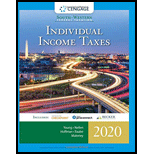
Individual Income Taxes
43rd Edition
ISBN: 9780357109731
Author: Hoffman
Publisher: CENGAGE LEARNING - CONSIGNMENT
expand_more
expand_more
format_list_bulleted
Concept explainers
Textbook Question
Chapter 16, Problem 2DQ
An individual taxpayer sells some used assets at a garage sale. Why are none of the proceeds taxable in most situations?
Expert Solution & Answer
Want to see the full answer?
Check out a sample textbook solution
Students have asked these similar questions
Compute the company's predetermined overhead rate for the year.
Please explain the correct approach for solving this financial accounting question.
Need help with this general accounting question
Chapter 16 Solutions
Individual Income Taxes
Ch. 16 - Prob. 1DQCh. 16 - An individual taxpayer sells some used assets at a...Ch. 16 - Alison owns a painting that she received as a gift...Ch. 16 - Prob. 4DQCh. 16 - Prob. 5DQCh. 16 - Prob. 6DQCh. 16 - Prob. 7DQCh. 16 - Prob. 8DQCh. 16 - After netting all of her short-term and long-term...Ch. 16 - Prob. 10DQ
Ch. 16 - Near the end of 2019, Byron realizes that he has a...Ch. 16 - Prob. 12CECh. 16 - Prob. 13CECh. 16 - Prob. 14CECh. 16 - On May 9, 2019, Glenna purchases 500 shares of...Ch. 16 - Prob. 16CECh. 16 - Prob. 17CECh. 16 - Elliott has the following capital gain and loss...Ch. 16 - Prob. 19PCh. 16 - Prob. 20PCh. 16 - Prob. 21PCh. 16 - George is the owner of numerous classic...Ch. 16 - Prob. 23PCh. 16 - Prob. 24PCh. 16 - Prob. 25PCh. 16 - Melaney has had a bad year with her investments....Ch. 16 - Prob. 27PCh. 16 - Prob. 28PCh. 16 - Prob. 29PCh. 16 - Prob. 30PCh. 16 - Prob. 31PCh. 16 - Prob. 32PCh. 16 - Prob. 33PCh. 16 - Prob. 34PCh. 16 - Prob. 35PCh. 16 - Prob. 36PCh. 16 - Prob. 37PCh. 16 - Dennis sells short 100 shares of ARC stock at 20...Ch. 16 - Elaine Case (single with no dependents) has the...Ch. 16 - Prob. 40PCh. 16 - Prob. 41PCh. 16 - Prob. 42PCh. 16 - Paul has the following long-term capital gains and...Ch. 16 - Helena has the following long-term capital gains...Ch. 16 - For 2019, Ashley has gross income of 38,350 and a...Ch. 16 - Prob. 46PCh. 16 - For 2019, Wilma has properly determined taxable...Ch. 16 - Prob. 48PCh. 16 - Gray, Inc., a C corporation, has taxable income...Ch. 16 - Harriet, who is single, is the owner of a sole...Ch. 16 - Ashley Panda lives at 1310 Meadow Lane, Wayne, OH...Ch. 16 - Paul Barrone is a graduate student at State...Ch. 16 - Prob. 1RPCh. 16 - Prob. 2RPCh. 16 - Prob. 3RPCh. 16 - Prob. 4RPCh. 16 - Prob. 1CPACh. 16 - Conner purchased 300 shares of Zinco stock for...Ch. 16 - Brad and Angie are married and file a joint...
Knowledge Booster
Learn more about
Need a deep-dive on the concept behind this application? Look no further. Learn more about this topic, accounting and related others by exploring similar questions and additional content below.Similar questions
- I am looking for help with this general accounting question using proper accounting standards.arrow_forwardBon Corporation has the following transactions: $820,000 operating income; $640,000 operating expenses; $55,000 municipal bond interest; $150,000 long-term capital gain; and $70,000 short-term capital loss. Compute Bon Corporation's taxable income for the year.arrow_forwardI need help with this financial accounting question using standard accounting techniques.arrow_forward
- Can you demonstrate the proper approach for solving this financial accounting question with valid techniques?arrow_forwardI need guidance with this general accounting problem using the right accounting principles.arrow_forwardCan you provide the accurate answer to this financial accounting question using correct methods?arrow_forward
arrow_back_ios
SEE MORE QUESTIONS
arrow_forward_ios
Recommended textbooks for you
 Individual Income TaxesAccountingISBN:9780357109731Author:HoffmanPublisher:CENGAGE LEARNING - CONSIGNMENT
Individual Income TaxesAccountingISBN:9780357109731Author:HoffmanPublisher:CENGAGE LEARNING - CONSIGNMENT


Individual Income Taxes
Accounting
ISBN:9780357109731
Author:Hoffman
Publisher:CENGAGE LEARNING - CONSIGNMENT




Understanding U.S. Taxes; Author: Bechtel International Center/Stanford University;https://www.youtube.com/watch?v=QFrw0y08Oto;License: Standard Youtube License